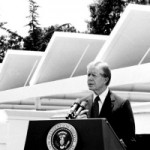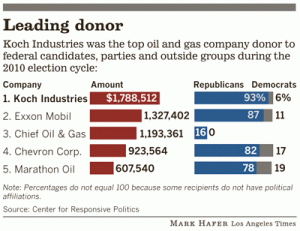Lots to report in the beginning of the new year from the Washington. The change in Congress has the White House changing its approach to encouraging energy efficiency and regulating greenhouses gases. In some cases the commitment to efficiency has been reaffirmed, in other cases it is not so clear. Throughout, however, is the reality of a new Congress that does not have the same interest in putting tax money up to incentivize energy efficiency. After the jump is information on the new Better Buildings Initiative, changes in policy making bodies and staff departures on the executive level, and the growing influence of the oil and gas industries in the effort to regulate greenhouse gases.
 Better Buildings Initiative
Better Buildings Initiative
At Penn State University last week, President Obama announced a new package of proposals – the Better Buildings Initiative. The multifaceted proposal targets commercial buildings to make them 20 percent more efficent – offering tax credits for energy upgrades, and a new federal grant competition for states and cities that would reward stringent energy efficiency requirements in commercial facilities. The plan seeks to save $40 billion for businesses over the next decade. There has understandably been a lot of coverage on the proposal: Check out the
White House’s press release, the
DOE’s summary, and the
White House’s fact sheet.
National Commission on Energy Policy Disbands
With shifts in power in the White House and Congress logically comes changes in the behind the scenes players who get legislation off the ground in Washington. Late last year Politico reported that the
National Commission on Energy Policy recently disbanded after eight years of work. The bipartisan NCEP worked to bring the parties together to advance energy policy – but the failure of comprehensive greenhouse gases legislation has led to the members of the commission to re-approach the debate. Nonetheless, a new energy policy program is being founded by the NCEP’s former executive director, Jason Grumet, with a new approach to the issue in light of current political realities. It’s an interesting aspect of environmental policy that is often overlooked due to the focus on elected officials. Check out Politico’s story
here.
Carol Browner Steps Down
Carol Browner, President Obama’s top energy and environmental adviser, is leaving the White House. One of Browner’s primary tasks was coordinating of the doomed cap-and-trade bill. Why is this relevant? 1. It will be worth watching the President’s commitment to energy and climate policy in the next two years, and thus, keeping people on staff who are aggressive about the issues. 2. City and State policy, is intertwined with the goals of the federal government, and a potential shift in priorities in Washington could have impacts on every other level of government. The
Financial Times and
Politico have covered the issue well.
Koch Brothers Target Greenhouse Gas Regulation
The infamous Koch Brothers’ firm is the largest single oil and gas donor to members of the
House Energy and Commerce Committee. Now they’ve circulated a pledge, being signed by members of the Committee, to
actively oppose the regulation of greenhouse gases. The story and below graphic are from the LA Times.

 Better Buildings Initiative
At Penn State University last week, President Obama announced a new package of proposals – the Better Buildings Initiative. The multifaceted proposal targets commercial buildings to make them 20 percent more efficent – offering tax credits for energy upgrades, and a new federal grant competition for states and cities that would reward stringent energy efficiency requirements in commercial facilities. The plan seeks to save $40 billion for businesses over the next decade. There has understandably been a lot of coverage on the proposal: Check out the White House’s press release, the DOE’s summary, and the White House’s fact sheet.
National Commission on Energy Policy Disbands
With shifts in power in the White House and Congress logically comes changes in the behind the scenes players who get legislation off the ground in Washington. Late last year Politico reported that the National Commission on Energy Policy recently disbanded after eight years of work. The bipartisan NCEP worked to bring the parties together to advance energy policy – but the failure of comprehensive greenhouse gases legislation has led to the members of the commission to re-approach the debate. Nonetheless, a new energy policy program is being founded by the NCEP’s former executive director, Jason Grumet, with a new approach to the issue in light of current political realities. It’s an interesting aspect of environmental policy that is often overlooked due to the focus on elected officials. Check out Politico’s story here.
Carol Browner Steps Down
Carol Browner, President Obama’s top energy and environmental adviser, is leaving the White House. One of Browner’s primary tasks was coordinating of the doomed cap-and-trade bill. Why is this relevant? 1. It will be worth watching the President’s commitment to energy and climate policy in the next two years, and thus, keeping people on staff who are aggressive about the issues. 2. City and State policy, is intertwined with the goals of the federal government, and a potential shift in priorities in Washington could have impacts on every other level of government. The Financial Times and Politico have covered the issue well.
Koch Brothers Target Greenhouse Gas Regulation
The infamous Koch Brothers’ firm is the largest single oil and gas donor to members of the House Energy and Commerce Committee. Now they’ve circulated a pledge, being signed by members of the Committee, to actively oppose the regulation of greenhouse gases. The story and below graphic are from the LA Times.
Better Buildings Initiative
At Penn State University last week, President Obama announced a new package of proposals – the Better Buildings Initiative. The multifaceted proposal targets commercial buildings to make them 20 percent more efficent – offering tax credits for energy upgrades, and a new federal grant competition for states and cities that would reward stringent energy efficiency requirements in commercial facilities. The plan seeks to save $40 billion for businesses over the next decade. There has understandably been a lot of coverage on the proposal: Check out the White House’s press release, the DOE’s summary, and the White House’s fact sheet.
National Commission on Energy Policy Disbands
With shifts in power in the White House and Congress logically comes changes in the behind the scenes players who get legislation off the ground in Washington. Late last year Politico reported that the National Commission on Energy Policy recently disbanded after eight years of work. The bipartisan NCEP worked to bring the parties together to advance energy policy – but the failure of comprehensive greenhouse gases legislation has led to the members of the commission to re-approach the debate. Nonetheless, a new energy policy program is being founded by the NCEP’s former executive director, Jason Grumet, with a new approach to the issue in light of current political realities. It’s an interesting aspect of environmental policy that is often overlooked due to the focus on elected officials. Check out Politico’s story here.
Carol Browner Steps Down
Carol Browner, President Obama’s top energy and environmental adviser, is leaving the White House. One of Browner’s primary tasks was coordinating of the doomed cap-and-trade bill. Why is this relevant? 1. It will be worth watching the President’s commitment to energy and climate policy in the next two years, and thus, keeping people on staff who are aggressive about the issues. 2. City and State policy, is intertwined with the goals of the federal government, and a potential shift in priorities in Washington could have impacts on every other level of government. The Financial Times and Politico have covered the issue well.
Koch Brothers Target Greenhouse Gas Regulation
The infamous Koch Brothers’ firm is the largest single oil and gas donor to members of the House Energy and Commerce Committee. Now they’ve circulated a pledge, being signed by members of the Committee, to actively oppose the regulation of greenhouse gases. The story and below graphic are from the LA Times.


Leave a Reply
You must be logged in to post a comment.